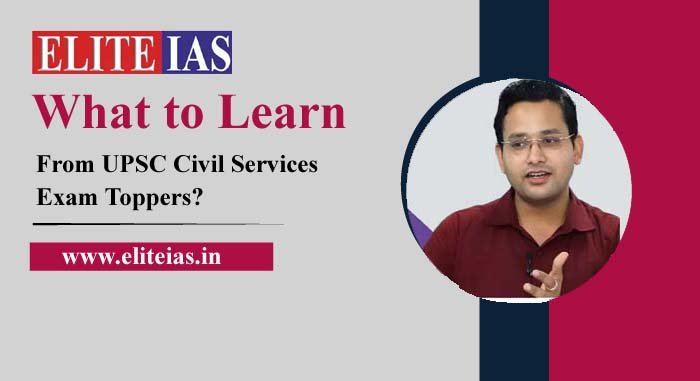
Civil Services Exam Toppers: Are you looking to adopt the study strategies of toppers? Those who have excelled in the UPSC Civil Services Examination?
Your goal is to increase your chances of success in this highly challenging exam. Known as one of the toughest exams in India, it demands a strategic and informed approach. If so, continue reading for more insights!
Each aspirant looks up to the achievers and dreams of joining their ranks. When the results are announced, aspirants actively seek advice from UPSC CSE toppers. They aim to formulate strategic plans and modify their approach to preparation. This helps them to effectively kick-start their preparation journey.
Acknowledging that preparing for the Civil Services Exam is a lengthy endeavour, it usually demands at least a year of dedicated study. Aspirants strive to reduce risks by following the paths of successful candidates. They aim to incorporate these strategies into their own preparation routines.
However, aspirants must remember that every topper has a personalized strategy. This strategy is customized to their unique expertise, skills, and experiences.
It’s observed that all toppers adhere to certain common techniques and strategies. Similarly, when crafting their individual strategies, aspirants are encouraged to take action. They should incorporate these proven methods into their study plans.
Considering the competitive nature of the UPSC Civil Services Exam, only a small fraction of aspirants actually pass. It becomes beneficial to examine and discuss the key preparation tactics used by toppers.
These methods are important for their success in such a rigorous exam. They are also important for any aspirant aiming for a career in civil service. It should be integrated into their study plans.
You Can Read Also: Exam Pattern and the Selection Procedure for UPSC IAS exam
Learn the Basics:
Understanding the UPSC CSE Syllabus
– Gaining a complete grasp of the syllabus is crucial. It allows you to understand what needs to be studied and what can be omitted. Also helps you to connect news and magazine reading to your syllabus.
– Tip for Familiarity: Write down the syllabus by hand and display it prominently in your study area. Familiarize yourself with it by reading it thoroughly three times a day, consistently.
Comprehending the UPSC CSE Exam Pattern
– Understanding the question patterns and trends in the UPSC Civil Services Exam is essential. This understanding is crucial in guiding you to tailor your study plan effectively. It helps you know not just what to study, but also how it will be assessed in the exam.
– Tip for Preparation: Start by reviewing the previous years’ question papers. Analyze the patterns and trends in the questions to better understand the exam’s demands.
Choosing the Right Resources
– Focusing on a select set of study materials is key. Success in the exam often stems from in-depth and repeated study of a limited number of resources. This approach is more effective than skimming through a vast array of materials.
– Tip for Studying: Compile a list of essential and supplementary books. Build a strong base with the essential texts, and refer to the supplementary books for deeper insight.
Understand and Perfect the Core Elements:
Studying General Studies Subjects
– Understanding of the General Studies for the Civil Services exam is very important. Do it via self-study or by taking admission in UPSC coaching program. A strong foundation in these subjects is essential for success. No amount of time spent studying, whether hours, months, or years, can compensate for a weak foundation. If your basic understanding is lacking, your preparation may not be sufficient.
– Essential Tip: It’s advisable to avoid taking risks with your preparation strategy. Consider joining a coaching program to help establish a robust foundation in your General Studies subjects. If you are not able to come to Delhi, online coaching for UPSC are available nowadays. This is also very effective.
Newspaper Reading and Current Affairs Mastery:
– A significant portion of the UPSC CSE questions revolves around current affairs. This makes mastery in this area crucial for increasing your chances of passing the Prelims. It also enables effective leveraging of current events in the Mains. Your knowledge of ongoing issues is also important during the Personality Test.
– Tip for Excellence: Commit to thoroughly study (rather than just reading) the newspaper daily. Subsequently, use a monthly current affairs magazine for comprehensive revision. You can join test series for UPSC, it is available online as well as offline. Joining a test series makes you more disciplined.
Importance of Regular Revision:
– It’s important to acknowledge that only a fraction of what you study today will stay in your memory over time. Regular revisiting of the material is crucial for effective recall of information. This practice also ensures a smooth transition between topics during the exam.
– Tip for Solidifying Knowledge: Develop a structured revision plan. Revisit the study material after three days, then a week, a month, and finally after three months.
Sharpen Your Skills and Knowledge:
Practicing Multiple Choice Questions (MCQs)
– Regular practice of MCQs is important for your preparation. Coupled with performance evaluation, it enhances the speed and accuracy of your responses in the Prelim Test. Additionally, engaging in MCQs is an effective way for a comprehensive revision of the UPSC CSE syllabus.
– Strategy Tip: Focus on your strengths and weaknesses to prioritize topics. Practice answering questions within the set time limits. Around 3 to 4 months before the exam, join a Prelims Test Series and maximize your practice.
Improve Answer Writing Skills
– Developing the art of writing succinct and relevant answers is a process that demands consistent practice. It’s not enough to rely solely on the knowledge from classes. Effective answer writing requires careful structuring, prioritization of content, and time management. The 100 days post-Prelims should be dedicated to revising subjects and improving scores rather than learning a new skill.
– Expertise Tip: After completing 3 months of foundational study, begin a daily practice of writing one answer. This habit will inculcate structured writing and effective application of knowledge. Post-Prelims, participate in a Mains Test Series.
Focusing on Improvement Areas
– Your weaknesses should be viewed as opportunities for growth, not as setbacks. Avoid overthinking and excessively analyzing your performance. Instead, focus on identifying and strengthening areas that need improvement.
– Advancement Tip: Consider the option of joining a mentorship program. Such a program can assist you in creating a strategic preparation plan for the UPSC CSE. It will assist in pinpointing areas that require improvement. Additionally, it provides tailored guidance for your preparation journey.
Enhance Your Preparation Skills:
Building Self-belief
– Every successful candidate has a strong belief in themselves. This is true even when others may not share the same level of confidence. Preparing for the UPSC exam requires a substantial commitment, often spanning a year or more. You might find that not everyone around you understands or supports your decision. However, it’s important to remember that your journey and goals are unique to you. You are the sole architect of your own dreams and aspirations.
– Empowering Tip: Always remember that you are not defined by others’ opinions. Your dreams, no matter how unrealistic they may seem to others, are valid and meaningful to you.
Maintaining Discipline
– Discipline is key, especially when motivation wanes. As you prepare for the UPSC CSE, adopting a disciplined approach is crucial. This applies to both your lifestyle and study habits. Discipline is key to maintaining focus and keeping your determination alive. It also ensures maximum productivity during your preparation.
– Structural Tip: Establish a daily routine, monitor how you spend your time. Also identify any time-wasting activities, for improvement in you study schedule.
Upholding Consistency
– The duration of your daily study sessions, whether an hour or two, isn’t as crucial as consistency. Maintaining a steady study rhythm is key. This is especially true on days when the material appears challenging or difficult to understand.
– Productivity Tip: Avoid comparing each day to the previous one. Approach each day afresh, aiming to dedicate as many hours as possible to cultivate a steady and effective study habit.
Strengthening Determination
– Success in the Civil Services Exam goes beyond mere willpower. It demands an unwavering determination. You must be resolutely committed to finding ways to achieve your goal. Prioritizing your goal above everything else, especially distractions, is essential.
– Driving Tip: Reflect on the moment you decided to embark on this journey and the motivations that propelled you forward.
Boosting Motivation
– Experiencing dips in motivation is a common aspect of the long UPSC CSE exam preparation journey. It’s crucial to find ways to sustain motivation. Sustained motivation helps in shifting perspectives and setting goals. It also aids in making plans, enhancing skills, and maintaining consistency.
– Encouragement Tip: Keep track of your progress and celebrate your small successes. Engage with motivational literature and stories to keep your spirits high.
Aim for Maintaining a Balance in Your Preparation:
Embracing Patience
– The journey through the UPSC CSE is demanding and arduous. Every day marks a new beginning, requiring your full dedication and effort. Patience in this process enables you to set goals that are more realistic and attainable. This approach fosters perseverance and resilience.
– Daily Tip: Focus on the efforts you put in each day, rather than fixating on the end result.
Cultivating an Optimistic Mindset
– There will be times when you may feel demotivated, such as when you struggle with a complex topic or fail to get the answers right. These feelings can also arise when facing personal challenges. In these moments, maintaining a positive attitude and focusing on solutions within your control is crucial.
– Tip for Persistence: Consider practicing meditation for mental relaxation. If a subject seems challenging, revisit it multiple times or seek guidance from someone knowledgeable.
Achieving Balance
– It’s essential to strike a balance between your studies and personal life to avoid mental, emotional, and physical burnout. Preparing for the UPSC CSE is akin to running a marathon, not a sprint. Taking regular breaks is necessary to maintain your pace and reach the goal.
– Tip for Stability: Engage in a hobby that not only keeps you grounded but can also be a point of interest in your Detailed Application Form (DAF). It will indirectly help you in IAS interview or personality test.
Toppers often stand out by employing basic but effective strategies that many overlook. Some aspirants get lost in complex tactics. In contrast, toppers adhere to simpler, tried-and-tested methods and ultimately achieve success.
Final Tip: Adhere strictly to the strategies discussed and maintain a simple, consistent preparation routine.
Your journey to achieving your dream in the UPSC CSE hinges on what I call your ‘D3’: dedication, discipline, and determination. These qualities must be evident in every aspect of your preparation.
Best of Luck!



